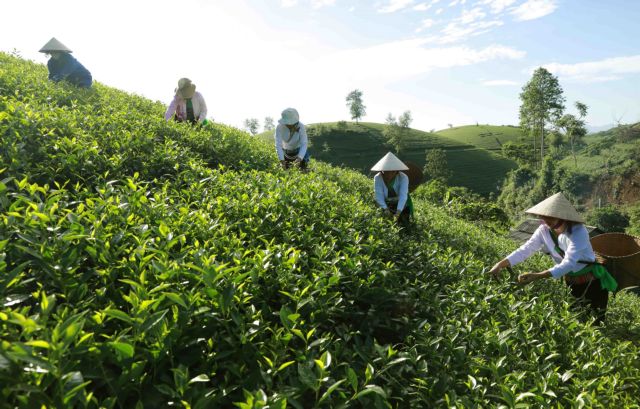 Economy
Economy

 |
| Farmers harvesting green tea at a farm in Phú Thọ Province. — VNA/VNS Photo |
Ly Ly Cao
HÀ NỘI — As one of the largest tea exporters in the world, Việt Nam stands at a pivotal stage, poised to expand its tea trade with the UK. Thanks to the UK-Vietnam Free Trade Agreement (UKVFTA), the prospects for Vietnamese tea in the UK market are brighter than ever.
This trade agreement eliminates many tariffs and technical barriers, offering Vietnamese tea producers and exporters a golden opportunity to tap into the UK's unique tea culture.
Việt Nam is one of the world's original regions of tea cultivation, alongside Yunnan (China), Thailand, Laos, Myanmar and India.
With over 130,000 hectares of tea plantations and an annual production of approximately 220,000 tonnes of dried tea, the country ranks as the fifth-largest tea exporter globally, Hoàng Vĩnh Long, chairman of Việt Nam Tea Association, told Việt Nam News.
Each year, Việt Nam exports around 140,000-150,000 tonnes of tea, generating a revenue of US$240-245 million, while domestic consumption contributes another $500 million.
Despite these impressive numbers, the average price of Vietnamese tea on the global market remains low, around $1.75 per kg, significantly below the global average of $2.8-3. Addressing this gap is essential for elevating Việt Nam’s position from being a 'low-cost tea supplier' to a premium tea producer, Long said.
Meanwhile, the UK is synonymous with tea culture. From black teas sourced from former colonies to the celebrated tradition of afternoon tea, tea holds a special place in British society.
While black tea has long dominated the UK market, a shift is occurring, said Đoàn Anh Tuân, director of Future Generation Corporation.
Health-conscious consumers are increasingly embracing green tea, renowned for its cardiovascular benefits and antioxidant properties. Việt Nam, as a leading green tea producer, has a competitive edge in this evolving market.
"Currently, we are not exporting much to the UK. While Việt Nam's green tea market share is still small compared to black tea, consumers are increasingly becoming familiar with green tea," Tuân said.
"Foreign media also emphasise that green tea is healthier than black tea, leading to the growing market share of green tea."
Moreover, the UK's growing demand for discerning and speciality teas aligns well with Việt Nam's diverse tea offerings, including its unique Shan Tuyết tea, a wild-grown, high-quality product from ancient tea trees in mountainous regions.
UKVFTA: A game changer
Under the UKVFTA, Việt Nam enjoys preferential access to the UK market. Previously, smaller tea packages of under three kilograms faced tariffs, which discouraged value-added exports.
The new agreement removes these tariffs, incentivising Vietnamese companies to shift from bulk exports to branded, packaged teas tailored for UK consumers, Tuân said.
However, penetrating the UK market is easier said than done.
British consumers demand high-quality tea with traceable origins and eco-friendly credentials. These expectations require Vietnamese tea producers to adopt stringent quality control measures, implement sustainable farming practices and enhance branding and marketing efforts.
Long said that one of the Vietnamese tea industry's primary goals now is to escape that low-cost trap.
He suggests that Việt Nam develop concentrated tea-growing regions linked to processing facilities. Collaborative models between tea farmers and processing companies can ensure consistent quality and safety.
"We are currently collaborating with provinces known for tea cultivation to facilitate exchanges, workshops, discussions and formal engagements to support businesses," Long said.
"Provinces intervene primarily at the policy and support level, while businesses work alongside farmers to establish tea-growing regions that produce stable and safe products. With this approach, we can confidently enter the European and UK markets."
Adopting advanced technology is also a key factor helping exporters penetrate demanding markets.
“Many Vietnamese tea companies, like Future Generation Corporation, are investing in modern processing and packaging technology. This not only improves quality but also enables the production of speciality teas that appeal to premium markets,” Long added.
Vietnamese companies should also enhancing branding with attractive packaging, clear labelling and storytelling to capture consumer interest. Highlighting the cultural heritage and unique characteristics of Vietnamese teas, such as Shan Tuyết's wild origins, can differentiate the product in a competitive market.
Long added that exporters must adhere to certifications, like the Rainforest Alliance, organic farming standards and Fair Trade principles, as they not only open doors to the UK market but also build trust with discerning consumers.
Meanwhile, Tuân said that understanding UK consumers' preferences, from flavour profiles to packaging styles, is essential for crafting products that resonate with the target audience.
Despite the challenges, the future of Vietnamese tea in the UK market is promising. Companies like Future Generation Corporation are leading the way by transitioning from bulk exports to high-value branded products. This strategy not only increases revenue but also enhances Việt Nam's reputation as a tea-producing nation.
Furthermore, the global trend towards health and wellness is driving demand for green and speciality teas, areas where Việt Nam has a natural advantages. — VNS




